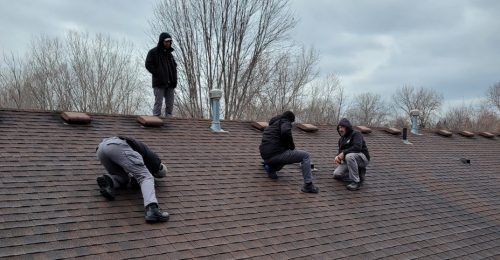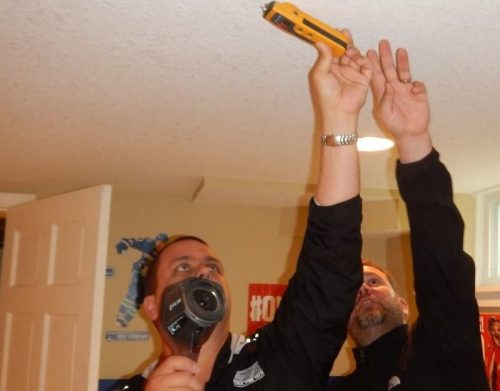I get a lot of training questions from aspiring home inspectors about how to get into this business and how to get trained. I have some advice for people who don’t get hired by a company with an established training process, but first, I’d like to share our internal process here at Structure Tech. We’ve worked hard at developing a repeatable training process, largely by following advice found in The E-Myth. I shared this process back in 2018, but we’ve made some major changes to it since then, and we’ve stuck with our new process for the past five years.
The Structure Tech training process for home inspectors
In the interest of transparency and to help advise any other multi-inspector company owners out there, I’m sharing the Structure Tech training timeline, omitting a bunch of steps that are specific to my company.
Pre-hire
We complete a background check on all new hires. We also give them their first reading assignment, which is all blog posts tagged with ‘!Study Guide’. You can find these at https://structuretech.com/category/study-guide/. There’s some stuff in there that’s specific to my company, but most of this applies to ALL home inspectors. New hires must subscribe to this blog and read every new post going forward.
And for the record, I don’t expect new hires to finish this immediately; it’s a huge reading assignment. But I want them to get started ASAP.
We also have employees read and sign our company handbook.
Week 1: Onboarding
Day 1: we meet at the office and go over a ton of orientation-type stuff:
- Introduction to the team
- Office tour
- Review the training process and first week agenda
- Lunch with the Leadership Team
- Review of Job Requirements
- Discuss goals
- Complete any additional hiring paperwork
- Logins for technology
- Email and document management: Google Suite
- Daily home inspection photos and videos: Microsoft OneDrive
- Daily communication, announcements, team chats, fun photos, etc: Basecamp
- Home Inspection Reporting Software: Spectora
- Home Inspection Scheduling: Inspection Support Network
- Distribute work clothes (polo shirts, sweatshirt, spring jacket, winter jacket)
Days 2-5: Shadow inspectors in the field.
Reading assignments:
- ASHI Standard of Practice – the minimum acceptable standard for a home inspection from an ASHI inspector.
- Structure Tech Employee Handbook. Inspectors must regularly re-read this and use it daily. This training outline can be found there, and just about everything else that’s important.
- The National Home Inspector Exam study guides.
- The ASHI Standard of Practice. This is the minimum acceptable standard for a home inspection conducted by a member of the American Society of Home Inspectors. Inspectors should read and re-read these standards regularly.
- Local code books.
- Electrical Inspection of Existing Dwellings.
- CodeCheck Books.
Weeks 2-8: Classroom and field training
We spend every Monday together at the office, teaching one or more specific topics. I do the training at the office, using a home inspection training curriculum that we developed in-house. It pulls from hundreds of blog posts and videos I’ve created, as well as a few training videos that I haven’t made publicly available. These are LONG days.
From Tuesday through Friday, we have a field trainer take the trainees to as many home inspections as possible, where the focus is only on the topic for that week. For example, we spend one week covering nothing but electrical. We do electrical training all day at the office, then do nothing but electrical inspections for the rest of the week, visiting 20 – 30 houses.
We’ve found that focusing on one specific area for a week at a time dramatically increases comprehension and retention of the information and cuts down on the overall training time. Here’s our list of weekly topics:
- Roof/Chimney/Exterior & Garage
- Basement/Foundation/Structure
- Interior
- Electrical
- HVAC
- Plumbing
- Attic & Environmental
All the while, we incorporate report writing and client communication. It costs us more money to do training this way, as we have to pay someone full-time wages to train inspectors in the field, but I firmly believe that this is a worthwhile investment.
Weeks 9 – 12+: Mastering the Structure Tech Inspection
The final phase of our training is where we put it all together. We send our trainees along on full home inspections again, where they learn the flow process of a home inspection and begin to put everything they’ve learned into practice. They write home inspection reports, and we compare their finished reports to those of experienced inspectors in the field. We give the trainees a ton of coaching and training throughout this process, and we keep them in this phase until they can consistently produce error-free home inspection reports.
It’s possible but highly unlikely that home inspectors will complete this phase within twelve weeks. We have high standards for client communication, defect identification, and report writing. Also, new inspectors on our team must pass the National Home Inspector Exam, which is required for licensing in most states that have adopted licensing. While it’s a challenging exam, our inspectors are always well-equipped to pass it on their first try.
A few more thoughts
It’s a bonus if my home inspectors have had formal training, like a one- or two-week school, but it’s not necessary. The most important part of this job is on-site training and learning how to write reports properly, which only comes from intense peer review.
By the time our inspectors start inspecting on their own, they’ll have visited hundreds of houses. They don’t go on their own until I’m confident in their ability to recognize problems and communicate those findings verbally and in writing. If I wouldn’t trust one of my inspectors to inspect a house for a close friend or family member, they’re not ready to go out on their own.
Training for everyone else
So how are solo home inspectors supposed to get the needed training to go out on their own? They need to train with experienced home inspectors. That’s it, that’s all. No school will give this type of training. Sure, some schools might send home inspectors along on a handful of real-life, group inspections, but that’s just the first rung on the 28-foot training ladder.
For more information on this topic, check out my blog post: Home inspector training advice


